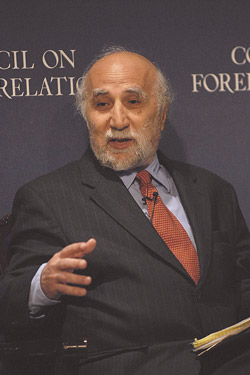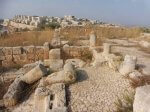Obituary: controversial Lebanese scholar Fouad Ajami dead
By Ray Hanania

Fouad Ajami, who was reviled by many Arabs but loved by the pro-Israel movement for his softened criticism of Israel and harsh assessments of the Arab World died on Sunday of prostate cancer at his home in Main, according to media reports Tuesday. He was 68 years old. News of Ajami’s death did not surface until Tuesday morning.
Mr. Ajami was beloved by many rightwing extremists for his tough neoconservative criticism of the Arab World, and his softball approach to the Palestinian issue. He was praised by Commentary Magazine, one of the more moderate anti-Arab hate publications, called him “grudgingly respected” and railed in a recent online column following his death against those who criticized him.
The late author and Palestinian scholar Edward Said, who died in 2003, had harshly criticized Ajami in the past, asserting that Ajami displayed “unmistakably racist prescriptions.” Professor Said had viewed Ajami as a modernday version of the scourge of “Orientalism” that defined the Western racism against Arab culture and people.
Ajami found a voice among the Western critics of Palestinian rights and the increasingly discontented Arab Street.
Ajami sounded the tone of brilliance, but his comments often rankled those who battled to force Israel to recognize its responsibilities to the non-Jewish civilians who were victimized by the creation of a Jewish State in secular Palestine in 1948 after a two-year long battle with local Palestinian militias and the incompetent surrounding Arab dictatorships.
Ajami was a Senior Fellow at the rightwing Hoover Institute at Stanford University, and was a MacArthur Fellowship recipient. He was also the favored talking head by the anti-Arab pro-Israel mainstream American news media. Although Ajami was often introduced as a “journalist,” Ajami had no professional journalism experience but did have an opinion. And he documented his rightwing views in many columns, journals and on frequent appearances in high profile national television discussions among media that discriminated against more mainstream American Arab journalism voices who were critical of Israel. Ajami was a close personal friend of Paul Wolfowitz, who helped orchestrate the Iraqi WMD lies, and administered Iraq as Deputy Secretary of State working with Donald Rumsfeld. Wolfowitz was drowned in scandal during his prior two years as head of the World Bank.
“Ajami succeeded because he pandered to the pro-Israel, anti-Arab causes with his conservative criticism that always seemed to blame the Arabs for everything that went wrong in the Middle East, ignoring the fundamental corruption of Middle East politics which was set in place by self-serving Western government policies. It was the West that created environment for the dictatorships and the undermining of true Democracy in the Arab World, not the Arab people, yet Ajami played off of the end result of that policy and placing the blame on the Arabs themselves,” one commentator who asked not to be identified said.
Ajami became the darling of the conservative movement when he endorsed the plans for war in Iraq by former President George W. Bush and the war’s true architect, former Vice President and rightwing fanatic Dick Cheney. Cheney’s company, Halliburton, became one of the single largest beneficiary of the War in Iraq receiving hundreds of billions of dollars in government contracts. Cheney, in reward for Ajami’s support, often heaped endless praise and accolades on Ajami and the Bush administration often pushed media to include him as a talking head on Middle East discussions and on assessments of the Iraq war.
In gratitude to his political mentor Cheney, Ajami often asserted that the “Arab Spring” and the “growth” of Democracy “threatening” the Arab World was due as a “direct result” of the Bush-Cheney invasion of Iraq, an assertion that is ridiculed as partisan political pablum.
And, when Ajami attacked Barack Obama following Obama’s election as the first Black President of the United States, AJami’s popularity among the extremist right and the fanatical Tea Party movement skyrocketed.
Ajami’s support for the illegal, unprovoked invasion of Iraq, which had less to do with fighting terrorism or freeing the Iraqi people than it did with the revenge sought out by Bush and Cheney, who worked under the president’s father, George H.W. Bush who led the war to force Iraq to withdraw from Kuwait. While the elder Bush lost his re-election, the younger Bush and Cheney stewed in anger as they watch Iraq’s dictator Saddam Hussein regale in continued authoritarian power until March 2003. Many people believe that the backing of Ajami helped counter Arab opposition to the war in Iraq, and that the invasion actually helped al-Qaeda and Islamic extremism build a base there that today is seen as threatening to overthrow the American-favored puppet government of Nouri al-Maliki who became the American backed Prime Minister of Iraq in 2006.
Fouad Ajami was also co-chair of the Herbert and Jane Dwight Working Group on Islamism and the International Order. From 1980 to 2011 he was director of Middle East Studies at the Johns Hopkins University. He is the author of The Arab Predicament, Beirut: City of Regrets, The Dream Palace of the Arabs, and The Foreigner’s Gift. His writings included four hundred essays on Arab and Islamic politics, US foreign policy, and contemporary international history. In 1982, according to an online biography at the Council on Foreign Relations, Ajami was granted the five-year MacArthur Prize Fellowship, and in 2006 received the Bradley Prize for Outstanding Achievement. In November 2006 Mr. Ajami was awarded the National Humanities Medal. He is a member of the board of advisers of Foreign Affairs.
(Ray Hanania is an award winning former Chicago City Hall reporter and columnist. He is the managing editor of The Arab Daily News online www.TheArabDailyNews.com. His bio is at www.TheMediaOasis.com.)
[subscribe2]
Related articles


- Israelisnipers shooting and killing hospital workers in Gaza - December 11, 2023
- CAIR Condemns Israeli Executions of Wounded, Unarmed Palestinian in West Bank - December 11, 2023
- Arab and Muslim American voters face a “simple choice” between Biden’s inhumanity and Trump’s edgy politics - December 9, 2023


















 Middle-East Historian Fouad Ajami Dies at 68
Middle-East Historian Fouad Ajami Dies at 68








